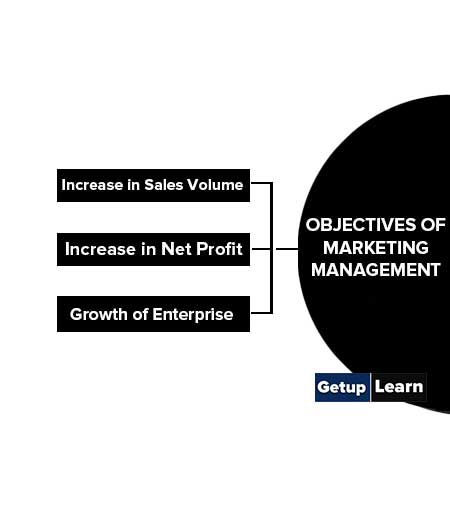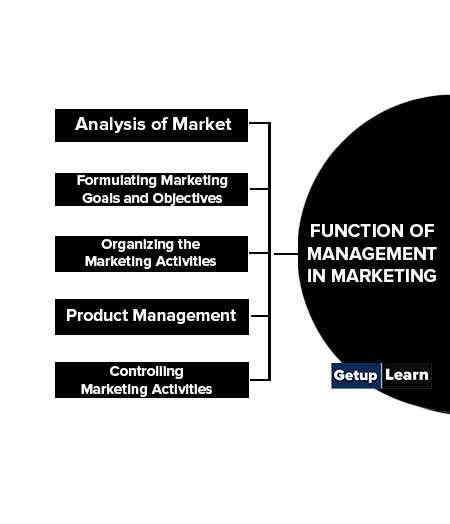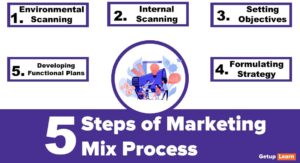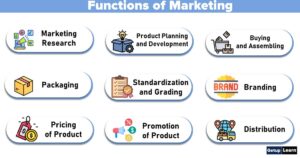
Table of Contents
Objectives of Marketing Management
According to Peter Drucker, the well-known American Professor believed to be the father of modern management thought, it is marketing that distinguishes a business from other forms of organization. This statement is based on his view that the purpose of a business is to create customers. It is possible only when a business firm is successful in matching the ’ consumers’ needs’ and ’ customer satisfaction.
Following the three main objectives of marketing management that are explained below”

Increase in Sales Volume
The objective of marketing is not only the satisfaction of consumers’ needs but increase the sales volume of the concern also. An increase in sales volume will increase the profits of the concern as well as its future growth potentiality.
Increase in Net Profit
Profit is residual of sales minus costs. When sales increase, the costs reduce due to economies of scale and there is an increase in net profits. It is through marketing that proper consumer needs are sorted out and satisfied which in turn increases the net profits of the organization. So, a number of marketing experts agree that the maximization of profits is one of the prime goals of marketing.
Growth of Enterprise
The object of an organization is stability with growth and profitability. Marketing contributes to it by knowing all about the customers and providing them with what they demand. It will increase the goodwill, sales, and profits of the enterprise.
When an organization has sufficient profits, then the resources are generated and invested back for growth. It has been realized that even at a level, the economy can grow by free playing or market forces.
Difference Between Selling and Marketing
The old sense of making a sale is telling and selling, but in a new sense, it is satisfying customer needs. Selling occurs only after a product is produced. By contrast, marketing starts long before a company has a product. Marketing is the homework that managers undertake to assess needs, measure their extent and intensity, and determine whether a profitable opportunity exists.
Marketing continues throughout the product’s life, trying to find new customers and keep current customers by improving product appeal and performance, learning from product sales results, and managing repeat performance. Thus selling and advertising are only part of a larger marketing mix-a set of marketing tools that work together to affect the marketplace.
These are some points of difference between selling and marketing:
Difference Between Selling and Marketing
| S.No. | Marketing | Selling |
| 1. | Marketing includes selling and other activities like various promotional measures, marketing research, after-sales service, etc. | Selling is confined to the persuasion of consumers to buy a firm’s goods and Services. |
| 2. | It starts with research on consumer needs, wants, preferences, likes, dislikes, etc., and continues even after the sales have taken place. | Selling starts after the production process is over and ends with the handing over the money to the seller by the buyer. |
| 3. | The focus is on earning profit through the maximization of customers’ satisfaction. | The focus is on earning profit through the maximization of sales. |
| 4. | The customer’s need is the central point around which all marketing activities revolve. | A fragmented approach to achieve short-term gain. |
| 5. | It is an integrated approach to achieving long-term goals like creating, maintaining, and retaining customers. | All activities revolve around the product that has been produced. |
| 6. | Stresses on the needs of the buyer. | Stresses on the needs of the seller. |
Nature of Marketing Management
When we discuss the nature of marketing management, we come to know that it is both a science as well as an art. The handling of marketing responsibilities clearly calls for a diversity of human talents. These responsibilities require men who have personality traits that will enable them to do an effective job in dealing with customers.
They must be artistic and imaginary people to create effective advertising and sales programs and to develop new ideas in distribution methods. They must have strong analytical abilities to cope with the strategical and logistical aspects of marketing operations.
This all proves that marketing management is a science. On the other hand, continuous practice in the problems of personalizing, advertising and sales promotion, etc., develops in them a group of ’artists’. Thus, we conclude that marketing is both sciences as w3ell as an art.
In modern times, these two streams the scientific aspect of marketing management and the artistic aspect of marketing management, influence and educate each other, and out of this intermingling comes the new generation of successful marketing managers.
In order to be a successful marketing manager, a person needs to acquire multidisciplinary skills from fields like art, psychology, economics, sociology, technology, accounting, etc. The customer needs are varying and before purchasing any product he may ask several questions to the marketers which must be answered to the satisfaction of the customer. This is possible only when a marketer has the skill and expertise to take up his job.
Function of Management in Marketing
The Marketing Manager is the person responsible for the performance of marketing activities which include a number of functions such as marketing research, storing, transportation, advertising, selling, distribution, promotion, etc. He is accountable, like other departmental heads, to the chief executive of the company.
There are several operating managers working under him who are responsible for performing particular activities, such as product development, marketing research, advertising, physical distribution, etc. The marketing manager has to control and coordinate their activities.
These are the function of management in marketing:
- Analysis of Market
- Formulating Marketing Goals and Objectives
- Organizing the Marketing Activities
- Product Management
- Controlling Marketing Activities

Analysis of Market
The main aim of marketing management is the creation and sale of company products. The sale of the product is possible only when the product is matched with the market. For it, the marketing manager has to make study the various environmental factors that affect the demand for their products. This analysis is done in marketing research.
Formulating Marketing Goals and Objectives
After analyzing the market, the marketing manager lays down the marketing goals to be achieved. The long-term goal of all the marketing activities is to earn a suitable return on the resources employed in the business.
The short-term goal may be fixed in terms of sales volume to be achieved in different market segments or the market share of the company in the total industry sales. As far as possible, these gaols must be verifiable and comparable.
Organizing the Marketing Activities
The third responsibility of the marketing manager is to develop an internal organization to achieve the goals laid down. The organizing function includes the following:
- Determining the total marketing activities to be performed in the light of the analysis of market conditions.
- Grouping of these activities
- Assigning the grouped activities to individuals and departments.
- Delegating them authority
- Exacting responsibility from them.
The activities of the marketing department can be organized on the basis of products, sales, areas, types of customers, specific marketing functions, or a combination of all these.
Product Management
The marketing manager plans and executes decisions in the matters concerning pricing, packaging, standardizing, branding, and grading decision also. He has also to take decisions as regards advertising media, distribution channels, storage facilities, transportation, minimum product stock, etc.
Controlling Marketing Activities
Control is an integral part of every managerial activity and marketing managers are no exception. He has to control the various activities of his department, Successful performance of marketing activities cannot be ensured unless these activities are properly controlled.
Control involves the determination of standards of performance, measurement of actual performance, comparison of actual performance with the standards, and correcting deviations if any.
What are the objectives of marketing management?
These are the three main objectives of marketing management given:
1. Increase in Sales Volume
2. Increase in Net Profit
3. Growth of Enterprise.
What are the 5 function of management in marketing?
Following are the 5 function of management in marketing:
1. Analysis of Market
2. Formulating Marketing Goals and Objectives
3. Organizing the Marketing Activities
4. Product Management
5. Controlling Marketing Activities.
















